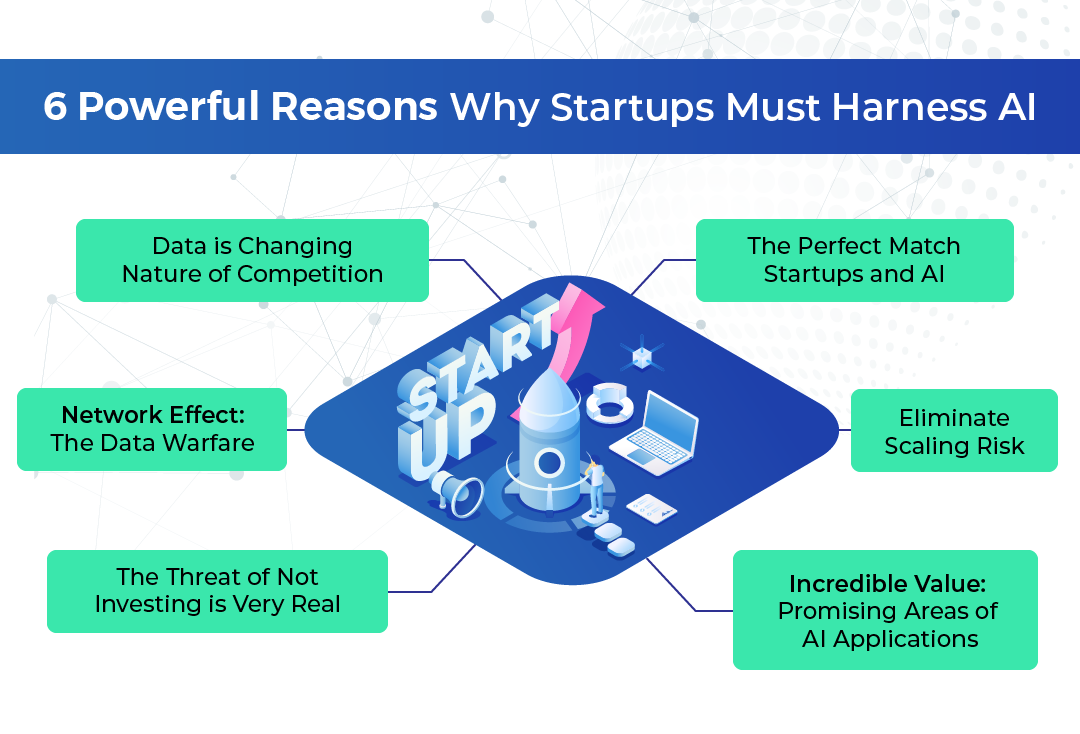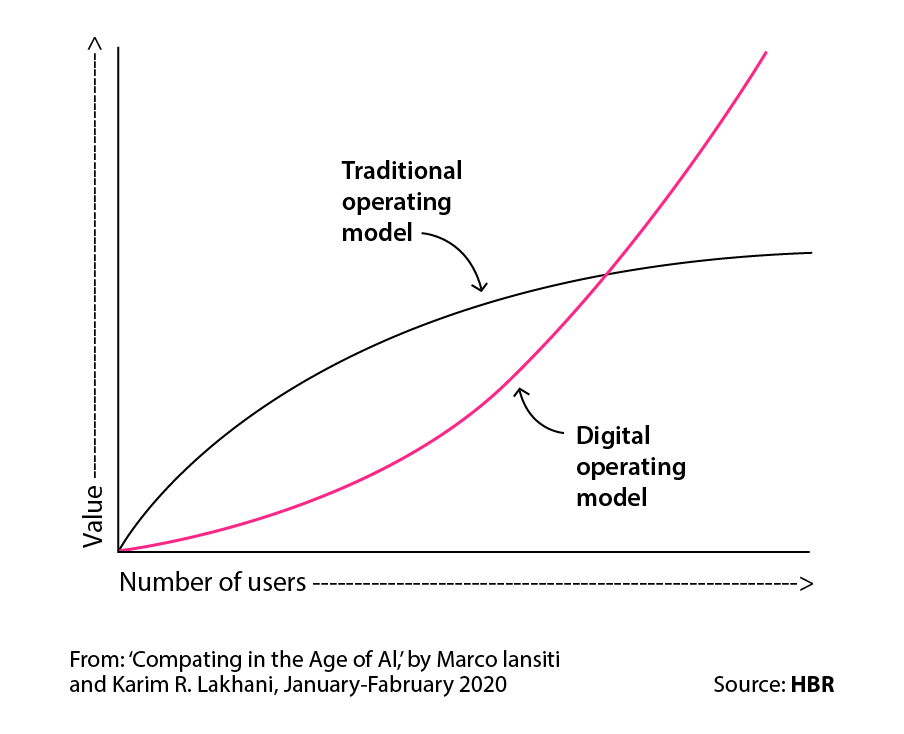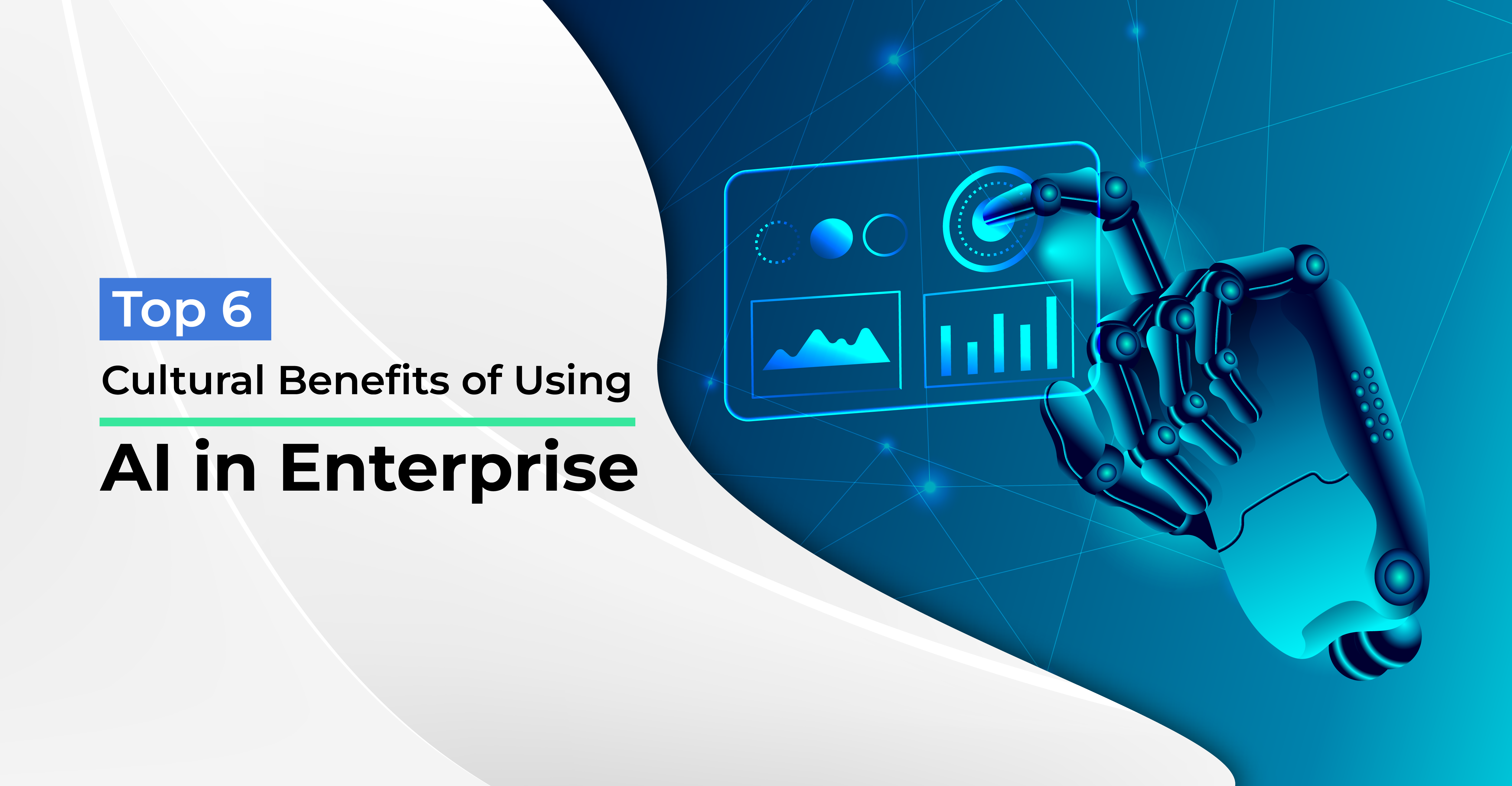Technology is an integral part of the new-age startups and young companies, but the term is highly subjective; how much “digital” is digital enough? Unfortunately, there is no right or simple answer as we live in a dynamic world with a large volume of change creating in a single stroke, both challenges as well as opportunities. Experts, as well as, leaders believe that early start is crucial to leverage AI. As Vikram Mahidhar and Thomas H. Davenport, express in their HBR article “Why Companies That Wait to Adopt AI May Never Catch Up” the road to AI is long, but those who incorporate it, may take it all! Here are the reasons why-
- Data is Changing Nature of Competition
The time it takes for new technology to reach mainstream adoption is accelerating exponentially. Soon, it could take just a few years for the technology to reach over 50% penetration, juxtaposed with decades it took earlier. Change management has grave import for startups as no one can truly claim to be free of legacy systems. Business models must be continually redefined, and it is challenging for many entrepreneurs to keep up.
Willingness to continuously look at the creative destruction of existing structures and technologies is the way forward.
As devices from watches to cars connect to the internet, the volume is increasing: some estimate that a self-driving car will generate 5000 gigabytes per hour. Meanwhile, artificial-intelligence (AI) techniques such as machine learning extract more value from data. Algorithms can predict when a customer is ready to buy; a jet-engine needs servicing, a person is at risk of disease, etc.. Industrial giants such as GE and Siemens now sell themselves as data firms.
2. Network Effect: The Data Warfare  The big tech companies are leveraging data to amass incredible amounts of power. The network effect helps them as the greater the number of users they onboard, the more data they get. The data is then used to improve the product and services that then attract more customers or users. More users generate more data, and the cycle goes on; this is how the tech giants like Facebook, Tesla, Google have grown unprecedentedly. Tesla collects the data from its customers and uses it to improve its software which has grown and developed breathtakingly. It is the reason why Tesla is the world’s most valued auto company. Tesla is a data company, and to compete with Tesla, auto giants need a shift their mindset away from mechanical engineering towards data; that is the extent of change that has transpired. In the words of former Amazon executive John Rossman,
The big tech companies are leveraging data to amass incredible amounts of power. The network effect helps them as the greater the number of users they onboard, the more data they get. The data is then used to improve the product and services that then attract more customers or users. More users generate more data, and the cycle goes on; this is how the tech giants like Facebook, Tesla, Google have grown unprecedentedly. Tesla collects the data from its customers and uses it to improve its software which has grown and developed breathtakingly. It is the reason why Tesla is the world’s most valued auto company. Tesla is a data company, and to compete with Tesla, auto giants need a shift their mindset away from mechanical engineering towards data; that is the extent of change that has transpired. In the words of former Amazon executive John Rossman,
“Data is the business model.”
3. The Threat of Not Investing is Very Real
In a survey by Ernst & Young March 2020 report, finds that Cloud, AI and IoT are the top priorities of transformation leaders across the globe. The investment in technology for governance is also picking up impressively. As the pandemic has made digital transformation a matter of priority, startups must think of further expanding the technological capabilities for better competitive advantage. The other aspect of advanced technologies is that it is easy and rewarding to begin early; as organizations grow in size, it becomes exceedingly challenging to incorporate and leverage advanced tech. 
One of the interesting findings of Deloitte’s- State of Enterprise AI report 2020 is that a significant number of respondents (2727 global executives from nine countries) is that they feel AI is getting easier. The survey results indicate a buy over build preference. The lack of data scientists who can program in PyTorch or TensorFlow is also one influencing factor. But even though outsourced AI would clear one set of hurdles, other challenges remain.
The level of uncertainty after the pandemic is historic. Also, spending on digital transformation and advanced technologies is going to increase, and startups must take some technological leaps to create a competitive edge and be hyper-agile.
There is an ever-widening chasm between those who are experimenting with AI and those who are waiting for the technology to mature, expertise to be easily available, or are adopting the “fast follower” approach. Then there are those bootstrapped or young startups which have not yet given a thought to AI.
There are three types of companies:
- Those who are experimenting and making progress with AI, ML and Big data, etc.
- Those who are “fast follower”, waiting for the technology to mature, expertise to be easily available.
- Those who see feasible, ROI driven advanced tech as distant possibility Except for experimentation, the other approaches are highly risky.
4. The Perfect Match Startups and AI
Even though Ant Financial Services Group was spun out of Alibaba, its meteoric rise serves as an eye-opener for every startup. In 2019, just five years into operations, this company had 1 billion customers; Ten-times as many as the largest US bank with a tenth of staff. It became a company with a valuation of $ 150 billion, half that of the world’s most valued financial-services company, JPMorgan Chase. The reason is that at its core, AI runs the entire show. From loans, advice, and operations, everything is managed by AI. It is a treasure trove for startups to ignore. Young organizations can build their company around AI or can exploit AI to the maximum, much more than the older orgs, and hence it is the perfect match.
5. Eliminate Scaling Risk
Hundreds of years after Alfred Chandler described the concepts of scaling, which were hitherto limited to labor and management with traditional IT infrastructure, we have reached a stage via AI, where scaling happens without the typical constraint of diminishing returns. The graph depicts the effect of digital operating models at scale. 
6. Incredible Value: Promising Areas of AI Applications
The area in which AI should be applied today baffles chief executives around the world, and it is even more significant for startups with tight budgets to identify these areas. Extensive research at McKinsey Global Institute reveals that around 40% of the value that analytics creates comes AI’s “deep learning” technique. 2/3rd of the entire AI opportunity lies in two areas:
- Supply-Chain Management/Manufacturing: $1.2 Trillion – $ 2 Trillion Potential Value Creation
For manufacturing the greatest value that can be created is in the area of predictive maintenance- $500-700 billion. AI’s capacity to crunch huge amounts of data, finding anomalies in audio and video to prevent breakdowns, be it aircraft or assembly line.
AI based forecasting improves accuracy by 10-20%, which percolates into 5% reduction in inventory cost, and revenue increase by 2-3%. AI can optimize routing of delivery traffic, improving fuel efficiency and reducing delivery times. Companies have reduced as much as 15% fuel by optimization.
- Marketing and Sales: $ 1.4 Trillion – $ 2.6 Trillion Potential Value Creation
Customer service management and personalization areas are the most consequential. Speech recognition for call center management and call routing help deliver seamless service. Product recommendations are one of the most prominent areas of application. Also, Automate Voice, Email, Chat, and Social Media are also popular applications.
A lot of big providers, such as Salesforce, are beginning to offer ML predictions. You can get recommendations on related products, sales lead classification and warning you when a deal is going cold, finding alternate contracts, and even the best way to approach.
Misconstrued Notions about AI and other Advanced Technologies
Here are a few points to be considered before entrepreneurs invest in AI and advanced tech. The word on the street is that AI is yet to come of age, that it is highly oversold tech. This approach to AI is a bad idea and could jeopardize the initial success of startups if they do not ration for AI. Here are a few questions that can help startups decide and strategize:
- AI is yet not mature and thus highly risky and frugally rewarding
There are parts of AI like traditional ML, and even deep learning is old, and most importantly, their mathematical and statistical foundation is established. Hence the notion of maturity is not valid and correct.
- The best time to adopt AI would be when competitors or leaders have shown success
This notion can be highly damaging as in the present hyper-competitive world, time is a critical asset. It takes a lot of time to develop and train AI systems as they need to be tailored to specific business needs; ML needs to be fed with large amounts of data, and for NLP it can be difficult to get the project up and running. Early experimentation is an ideal practice.
- The Plug & Play approach with an experienced vendor will ensure success
Even if a company has built the system, taking it from the pilot and prototyping stage to the actual production system is a highly challenging task. This would involve reengineering of business processes and also redefine the human tasks around it. If a company wants to augment customer engagement, then they need to create multiple AI applications for marketing, sales, and customer service. There is no plug-&-play when serious AI applications are concerned.
- Advanced technology is applied for autonomous operations
Today, AI is oriented towards augmenting human effort rather than working autonomously. New AI systems entail new human roles and retraining for new ways of working. And even if the new systems are designed to work autonomously, the phase of interaction learning is critical and unavoidable.
- We can scale the AI Everest
AI requires a broader governance approach as the efficacy of its algorithms decay over time. They are built over historical data, and recent changes require that algorithms be updated and monitored by subject matter experts to ensure that the machine correctly interprets and is free of bias. So AI is a journey and not a destination. Though the incorporation of AI and other advanced tech is an uphill task, it is the only way startups can compete against tech giants, and is the only way they can continuously create competitive advantage. Begin early!
 All Posts
All Posts


